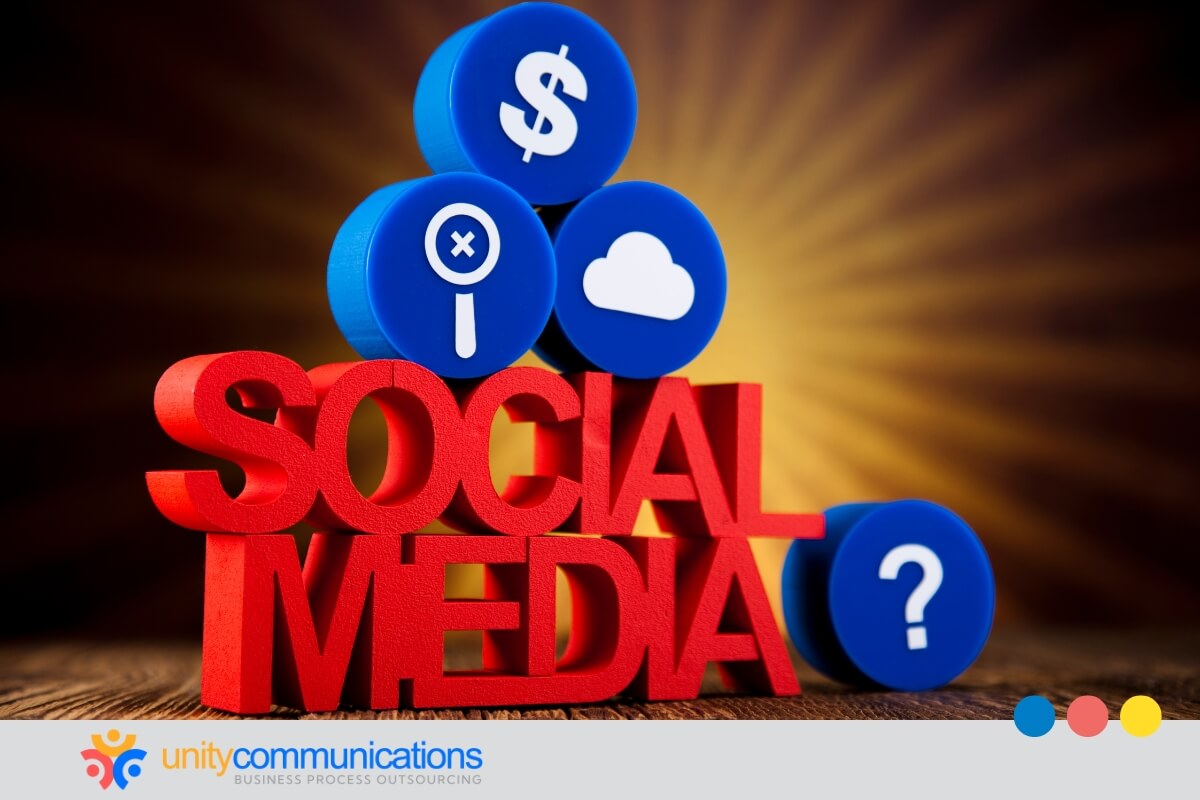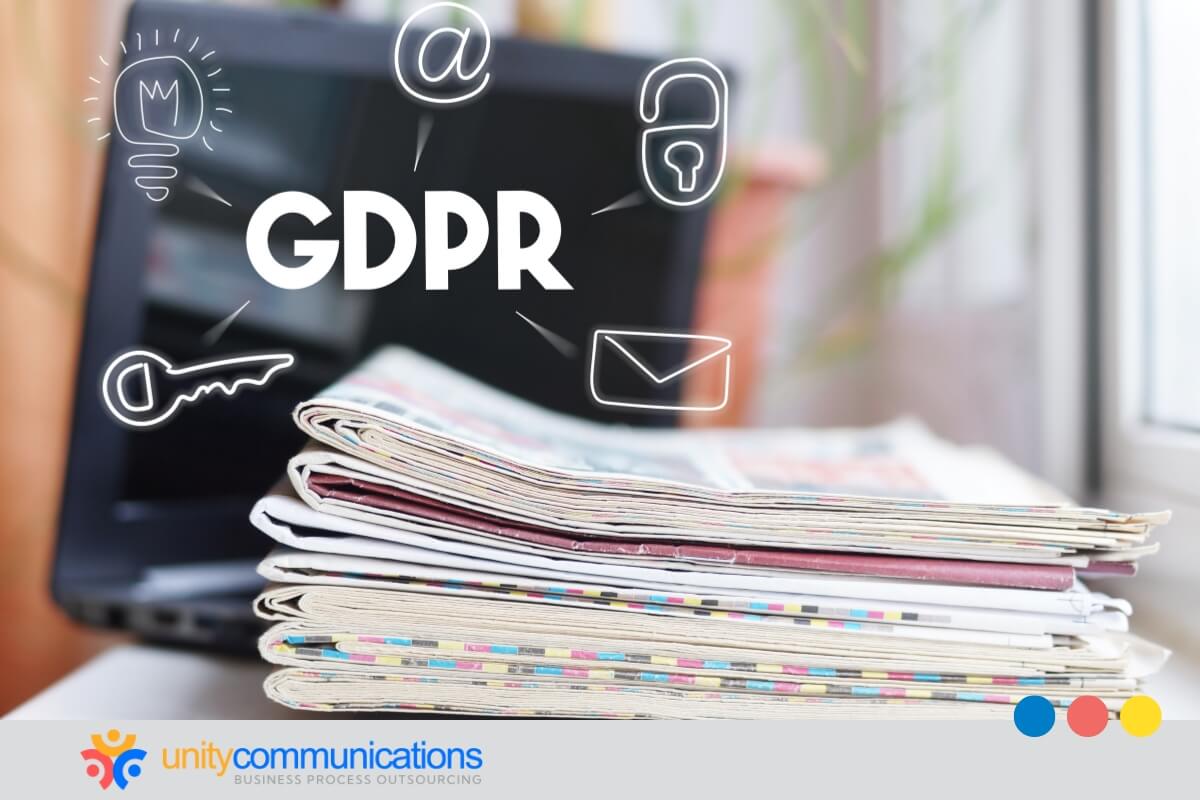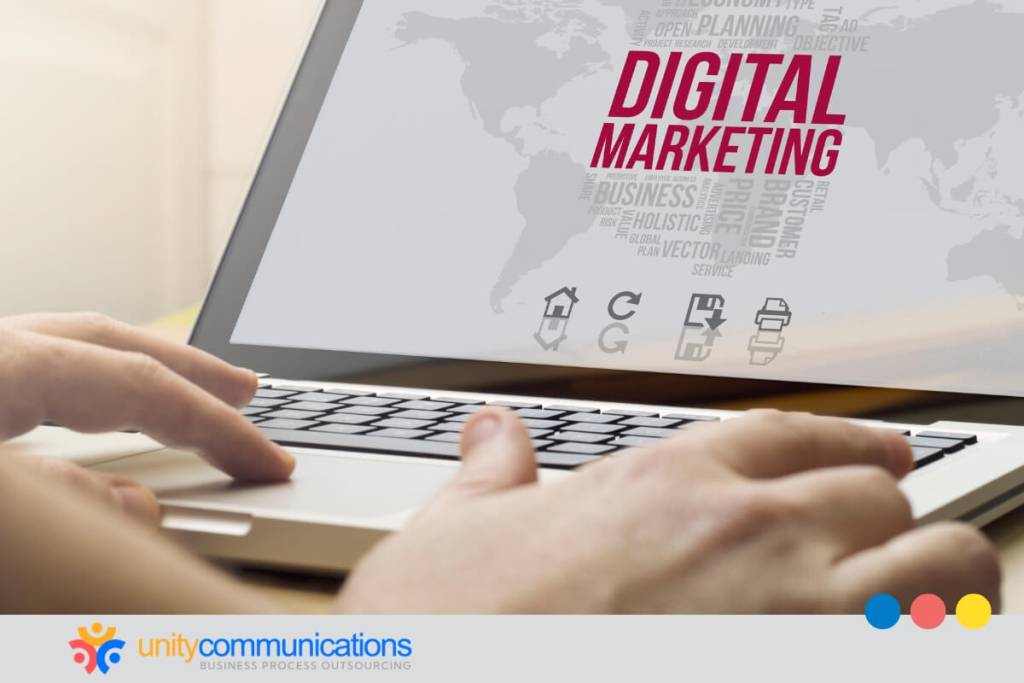IN THIS ARTICLE
Table of Contents
Technology advancements drive the rapid evolution of the digital marketing industry. Businesses must adapt to developments to stay relevant, maintain audience relationships, and sustain growth.
If you want to learn more about the different technologies shaping the digital marketing industry, this article is for you. We explore emerging tools and their transformative powers in elevating digital marketing services and strategies.
The ever-evolving digital marketing industry

Digital marketing has grown into a dynamic and complex field, encompassing various strategies and tools to reach diverse audiences. In recent years, it has transitioned from traditional advertising methods to hyper-targeted campaigns that leverage data and technology.
The core pillars of digital marketing are:
- Social media. Platforms such as Facebook, Instagram, X (formerly known as Twitter), and TikTok offer opportunities to engage with audiences, build awareness, and drive website traffic.
- Search engines. Search engine optimization (SEO) and pay-per-click (PPC) advertising help businesses rank higher in search engine results pages (SERPs) and attract organic and paid traffic.
- Content marketing. Creating high-quality content, such as blog posts, articles, and videos, can attract and retain a target audience, build brand authority, and generate leads.
Although these pillars remain staples, emerging technologies are pushing boundaries and redefining possibilities in the digital marketing industry.
Technological advancements driving change in digital marketing
Today’s advancements enable businesses to better understand consumer behavior, deliver personalized experiences, and engage with audiences in new and exciting ways. Many have integrated these solutions with their strategies, with Statista reporting that the global marketing technology sector grew from $508.9 billion in 2022 to $670 billion in 2023.
But what exactly makes these technologies attractive? Below explores some impactful tools and software shaping the future of the digital marketing industry:
1. Artificial intelligence (AI): transforming marketing strategies
AI has become a cornerstone of digital marketing, enabling businesses to automate repetitive tasks such as email marketing, social media posting, and data entry. According to a report conducted by Ascend2, marketing automation helped 91% of marketers achieve their goals.
Other key ways AI improves digital marketing are:
- Customer segmentation. AI-powered tools can segment customers based on various criteria, such as demographics, interests, and purchase history, to launch highly targeted marketing campaigns.
- Predictive analysis. AI algorithms can analyze vast data to identify patterns and trends and anticipate customer behavior and preferences in their specific industries.
- Tailored content. AI can generate personalized product recommendations, email newsletters, and social media posts that resonate with individual customers. Semrush reports that 68% of businesses see positive content marketing returns thanks to AI.
- Enhanced campaign performance. AI tools can optimize ad placements and bidding strategies to maximize return on investment (ROI). You can also use them for A/B testing, allowing you to quickly identify the most effective marketing strategies.
2. Machine learning (ML): enhancing consumer behavior analysis
ML, a subset of AI, has revolutionized the digital marketing industry by helping marketers further understand and engage with their audiences. By analyzing large datasets, ML algorithms can identify patterns, trends, and correlations that would be difficult, if not impossible, for humans to spot.
The primary applications of ML in digital marketing include:
- Precise targeting. ML algorithms can segment customers into highly targeted groups based on demographics, behavior, and preferences.
- Personalized marketing. By understanding individual needs, marketers can tailor marketing messages, product recommendations, and offers to each customer.
- Forecasting trends. Machine learning can predict trends in the digital marketing industry to help marketers anticipate changes in consumer behavior and adjust their strategies accordingly.
- Churn risk identification. You can identify customers at risk of churning through ML algorithms that analyze customer data for proactive retention efforts.
- Ad personalization: ML can personalize ad creatives, increasing click-through and conversion rates through data analysis.
3. Chatbots: revolutionizing customer engagement
Chatbots have emerged as a game-changer in customer service and engagement. These virtual assistants offer a convenient and efficient way for businesses to interact with their customers. According to Tidio, 24% of businesses report a positive ROI from their chatbot investments.
Today’s chatbots fall into two categories. The first one is rule-based chatbots, which follow predefined rules and scripts to respond to customer queries. AI-powered chatbots use advanced ML and natural language processing (NLP) techniques to understand and respond to complex inquiries.
Here are some ways chatbots transform the digital marketing industry:
- 24/7 availability. Chatbots can provide round-the-clock support to address customers’ questions promptly regardless of time zones.
- Reduced wait times. By automating routine tasks and answering FAQs, chatbots can significantly reduce customer wait times.
- Tailored experiences. Chatbots can analyze customer data to personalize recommendations, product suggestions, and troubleshooting advice.
- Enhanced customer satisfaction. By offering personalized digital marketing experiences, chatbots can boost customer satisfaction, regardless of your industry.
- Valuable insights. Chatbots can collect valuable data on customer preferences, pain points, and frequently asked questions.
- Scalability. Chatbots can process many customer interactions simultaneously, making them a scalable solution for businesses of all sizes.
4. Voice search: revolutionizing SEO strategies
The increasing adoption of voice-activated devices, such as Amazon Echo and Google Home, have significantly influenced how people search online. According to a PwC survey, 50% of respondents have used voice search to buy online and 25% are willing to try it in the future.
This trend is reshaping SEO strategies in the digital marketing industry as marketers must optimize content for natural language questions.
Voice search emphasizes long-tail keywords and conversational phrases, requiring businesses to rethink their keyword strategies. Additionally, featured snippets and local SEO have become critical for capturing voice search traffic, as users often seek quick, location-based answers to their queries.
5. Augmented and virtual reality: creating immersive campaigns
Augmented reality (AR) and virtual reality (VR) technologies are revolutionizing how brands engage with their audiences. They create immersive and interactive digital marketing experiences and are particularly impactful in industries such as retail, real estate, and entertainment.
Here are a few ways AR and VR change marketing:
- Try-before-you-buy. AR allows customers to visualize products in their own environment. For example, furniture retailers can use AR to let customers see how a sofa would look in their living room.
- Virtual try-ons. Beauty brands can leverage AR for virtual try-ons of makeup, allowing customers to experiment with different shades and styles.
- Engaging narratives. VR can transport audiences to different worlds and create immersive storytelling experiences, such as virtual tours of historical sites or interactive product demonstrations.
- Interactive experiences. AR and VR can be used to create interactive games and challenges that reward user engagement. This digital marketing strategy lets brands from all industries captivate audiences, drive brand loyalty, and increase sales.
- Hands-on learning. AR and VR are helpful in interactive training simulations. Employees can learn new skills in a safe and controlled environment.
The ethical side of emerging technologies

As businesses adopt these cutting-edge technologies, ethical considerations must remain a priority. Issues such as data privacy, AI bias, and transparency in advertising require careful attention to maintain consumer trust.
Regulations such as the General Data Protection Regulation (GDPR) emphasize the importance of safeguarding user data. Marketers must follow these laws while implementing ethical practices, such as providing clear opt-in options and using data responsibly.
Meanwhile, AI algorithms must avoid bias and discrimination. Hence, developers should prioritize fairness, accountability, and transparency and promote honesty in advertising practices.
Ethical marketing protects businesses from legal repercussions and enhances brand reputation and customer loyalty.
Outsourcing: a smart move in the digital era
Managing the complexities of emerging technologies in the digital marketing industry often requires specialized expertise and resources. This is where business process outsourcing (BPO) becomes invaluable.
What is BPO? It is the practice of delegating non-core functions to an external team. By outsourcing digital marketing and management of tools and software, you can:
- Access skilled professionals without the costs of hiring
- Leverage advanced tools without in-house investments
- Scale operations whether due to seasonal fluctuations or business growth
- Transfer risks associated with marketing technology to reliable BPO teams
- Focus on activities that directly influence your products and services
That’s how outsourcing works and why it’s popular across businesses of all sizes and industries. According to Statista, the global BPO market could reach $390 billion in 2024 and grow to $490 billion by 2029.
Outsourcing in digital marketing allows companies to focus on core activities while leveraging external expertise to handle marketing technology tasks. This includes AI implementation, data analytics, and chatbot development.
This collaborative approach ensures businesses stay competitive and agile in the ever-changing digital marketing industry.
The bottom line

The digital marketing industry is at the forefront of technological innovation, continually adapting to new tools and trends. Emerging technologies such as AI, ML, AR, and blockchain redefine how brands connect with your audiences. These advancements can unlock new opportunities for growth and customer engagement.
However, navigating this complex landscape can be daunting. Strategic decisions such as outsourcing can provide the necessary support to thrive in the digital age. Let’s connect if you’re considering outsourcing marketing technology!





